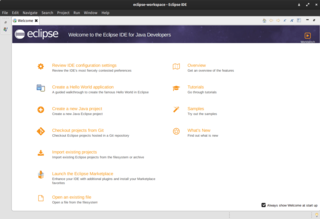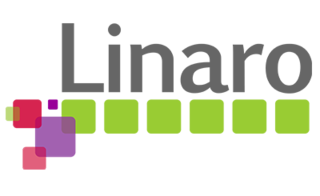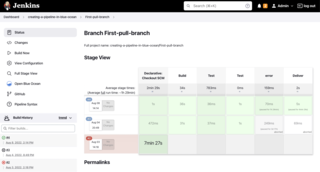
OSGi is an open specification and open source project under the Eclipse Foundation.

Eclipse is an integrated development environment (IDE) used in computer programming. It contains a base workspace and an extensible plug-in system for customizing the environment. It is the second-most-popular IDE for Java development, and, until 2016, was the most popular. Eclipse is written mostly in Java and its primary use is for developing Java applications, but it may also be used to develop applications in other programming languages via plug-ins, including Ada, ABAP, C, C++, C#, Clojure, COBOL, D, Erlang, Fortran, Groovy, Haskell, JavaScript, Julia, Lasso, Lua, NATURAL, Perl, PHP, Prolog, Python, R, Ruby, Rust, Scala, and Scheme. It can also be used to develop documents with LaTeX and packages for the software Mathematica. Development environments include the Eclipse Java development tools (JDT) for Java and Scala, Eclipse CDT for C/C++, and Eclipse PDT for PHP, among others.
The Open Bioinformatics Foundation is a non-profit, volunteer-run organization focused on supporting open source programming in bioinformatics. The mission of the foundation is to support the development of open source toolkits for bioinformatics, organise developer-centric hackathon events and generally assist in the development and promotion of open source software development in the life sciences. The foundation also organises and runs the annual Bioinformatics Open Source Conference, a satellite meeting of the Intelligent Systems for Molecular Biology conference. The foundation participates in the Google Summer of Code, acting as an umbrella organisation for individual bioinformatics-related projects.
The Python Software Foundation (PSF) is an American nonprofit organization devoted to the Python programming language, launched on March 6, 2001. The mission of the foundation is to foster development of the Python community and is responsible for various processes within the Python community, including developing the core Python distribution, managing intellectual rights, developer conferences including the Python Conference (PyCon), and raising funds.
Free Java implementations are software projects that implement Oracle's Java technologies and are distributed under free software licences, making them free software. Sun released most of its Java source code as free software in May 2007, so it can now almost be considered a free Java implementation. Java implementations include compilers, runtimes, class libraries, etc. Advocates of free and open source software refer to free or open source Java virtual machine software as free runtimes or free Java runtimes.

A hackathon is an event where people engage in rapid and collaborative engineering over a relatively short period of time such as 24 or 48 hours. They are often run using agile software development practices, such as sprint-like design wherein computer programmers and others involved in software development, including graphic designers, interface designers, product managers, project managers, domain experts, and others collaborate intensively on engineering projects, such as software engineering.
Google Developers is Google's site for software development tools and platforms, application programming interfaces (APIs), and technical resources. The site contains documentation on using Google developer tools and APIs—including discussion groups and blogs for developers using Google's developer products.

Aptana, Inc. is a company that makes web application development tools for use with a variety of programming languages. Aptana's main products include Aptana Studio, Aptana Cloud and Aptana Jaxer.
The following tables list notable software packages that are nominal IDEs; standalone tools such as source-code editors and GUI builders are not included. These IDEs are listed in alphabetic order of the supported language.
A committer is an individual who is permitted to modify the source code of a software project, that will be used in the project's official releases. To contribute source code to most large software projects, one must make modifications and then "commit" those changes to a central version control system, such as Git.

The Business Intelligence and Reporting Tools (BIRT) Project is an open source software project that provides reporting and business intelligence capabilities for rich client and web applications, especially those based on Java and Java EE. BIRT is a top-level software project within the Eclipse Foundation, an independent not-for-profit consortium of software industry vendors and an open source community.

Linaro is an engineering organization that works on free and open-source software such as the Linux kernel, the GNU Compiler Collection (GCC), QEMU, power management, graphics and multimedia interfaces for the ARM family of instruction sets and implementations thereof as well as for the Heterogeneous System Architecture (HSA). The company provides a collaborative engineering forum for companies to share engineering resources and funding to solve common problems on ARM software. In addition to Linaro's collaborative engineering forum, Linaro also works with companies on a one-to-one basis through its Services division.

Jenkins is an open source automation server. It helps automate the parts of software development related to building, testing, and deploying, facilitating continuous integration, and continuous delivery. It is a server-based system that runs in servlet containers such as Apache Tomcat. It supports version control tools, including AccuRev, CVS, Subversion, Git, Mercurial, Perforce, ClearCase, and RTC, and can execute Apache Ant, Apache Maven, and sbt based projects as well as arbitrary shell scripts and Windows batch commands.

Cloud Foundry is an open source, multi-cloud application platform as a service (PaaS) governed by the Cloud Foundry Foundation, a 501(c)(6) organization.
Xtext is an open-source software framework for developing programming languages and domain-specific languages (DSLs). Unlike standard parser generators, Xtext generates not only a parser, but also a class model for the abstract syntax tree, as well as providing a fully featured, customizable Eclipse-based IDE.
Eclipse Theia is an Eclipse open source project providing the Theia Platform and the Theia IDE.
Microsoft, a technology company historically known for its opposition to the open source software paradigm, turned to embrace the approach in the 2010s. From the 1970s through 2000s under CEOs Bill Gates and Steve Ballmer, Microsoft viewed the community creation and sharing of communal code, later to be known as free and open source software, as a threat to its business, and both executives spoke negatively against it. In the 2010s, as the industry turned towards cloud, embedded, and mobile computing—technologies powered by open source advances—CEO Satya Nadella led Microsoft towards open source adoption although Microsoft's traditional Windows business continued to grow throughout this period generating revenues of 26.8 billion in the third quarter of 2018, while Microsoft's Azure cloud revenues nearly doubled.
The OpenJS Foundation is an organization that was founded in 2019 from a merger of JS Foundation and Node.js Foundation. OpenJS promotes the JavaScript and web ecosystem by hosting projects and funds activities that benefit the ecosystem. The OpenJS Foundation is made up of 38 open source JavaScript projects including Appium, Dojo, jQuery, Node.js, Node-RED and webpack. Founding members included Google, Microsoft, IBM, PayPal, GoDaddy, and Joyent.

The Eclipse Adoptium Working Group is the successor of AdoptOpenJDK.









